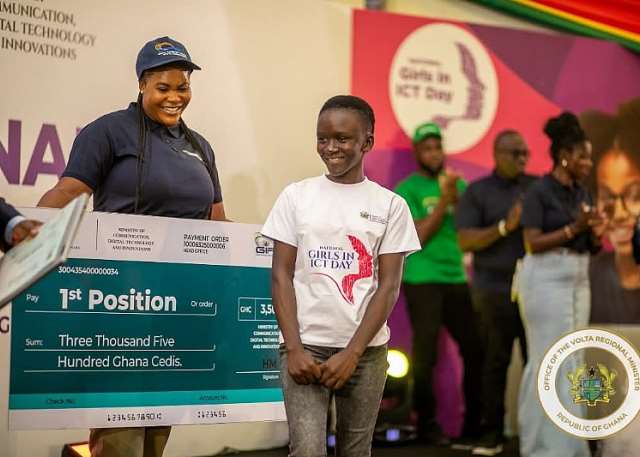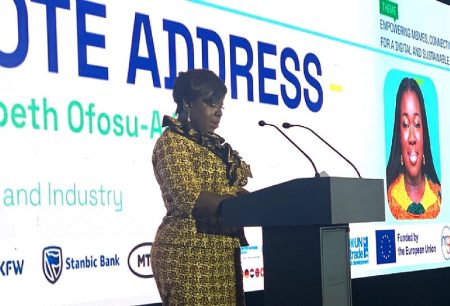The Girls-in-ICT program, a collaborative effort between the Ministry of Communication and Digital Innovations and the International Telecommunication Union (ITU), recently celebrated a significant milestone in Ghana’s Volta Region. One thousand girls from 18 districts successfully completed a rigorous three-week training program designed to equip them with essential ICT skills and encourage their pursuit of STEM-related careers. This achievement underscores the government’s commitment to bridging the gender gap in technology and empowering young women to become active participants in the digital economy. The culmination of the program was marked by an awards ceremony at the University of Health and Allied Sciences (UHAS), where the top performers received laptops, certificates, and cash prizes, further incentivizing excellence and recognizing the girls’ dedication to their technological development. The provision of these tools aims to create a sustainable learning environment, supporting continued growth and innovation in the field.
The success of the Volta Region program represents a significant step towards the national goal of training 3,000 girls and 300 teachers annually, including Persons Living with Disabilities. This ambitious target highlights the government’s commitment to inclusivity and its recognition of the transformative power of technology across all demographics. The Ministry’s plans to establish fully equipped ICT labs in the schools of the top-performing girls further solidifies this commitment, creating hubs for continuous learning and innovation within their communities. These labs will not only benefit the individual girls but also serve as a resource for other students and teachers, fostering a culture of technological advancement within the broader educational ecosystem. This initiative demonstrates a strategic approach to sustainable development, ensuring that the impact of the program extends beyond the immediate participants and contributes to long-term growth in the ICT sector.
Hon. Sam George Nartey, the Minister of Communication and Digital Innovations, lauded the program as a “game-changer,” emphasizing its potential to empower young girls and equip them with the skills necessary to thrive in the evolving digital landscape. He highlighted the importance of providing girls with access to digital tools and exposure to technological opportunities, effectively bridging the gender divide in the digital economy. This focus on digital literacy and skill development is crucial for preparing the next generation of female leaders in technology and ensuring that Ghana can fully leverage the potential of its human capital in the global digital arena. The minister’s endorsement reflects the government’s recognition of the program’s strategic importance in driving national development and its potential to transform individual lives.
Hon. Agnes Naa Momo Lartey, the Minister of Gender, Children and Social Protection, echoed these sentiments, praising the initiative and calling for broader support from the private sector, educators, and development partners to ensure its continued success and expansion. This collaborative approach is essential for maximizing the program’s impact and creating a sustainable ecosystem for female empowerment in technology. By engaging a diverse range of stakeholders, the program can leverage resources, expertise, and networks to create opportunities for mentorship, internship placements, and future employment for the participating girls. This multi-sectoral involvement will ensure that the program remains relevant and responsive to the evolving needs of the tech industry, creating a pipeline of skilled female professionals ready to contribute to Ghana’s digital future.
Togbe Ayim Adzokoto II, speaking on behalf of Togbe Afede XIV, commended the ITU and local partners for their ongoing dedication to the program and acknowledged the numerous challenges girls face in pursuing ICT careers. He highlighted obstacles such as inadequate infrastructure, pervasive gender stereotypes, economic limitations, and cybersecurity risks, emphasizing the need for a comprehensive approach to address these systemic barriers. Despite these challenges, he expressed optimism about the immense potential of young Ghanaian girls, recognizing their inherent brilliance, resilience, and innovative spirit. This acknowledgement of the existing obstacles, coupled with unwavering faith in the girls’ abilities, underscores the importance of creating supportive environments that nurture their talent and provide them with the tools they need to succeed.
The Girls-in-ICT program continues to make significant strides in empowering young women in Ghana, equipping them with the digital literacy and skills required to thrive in the 21st-century economy. By fostering an inclusive environment and promoting innovation, the program is not only narrowing the gender gap in technology but also contributing to a more balanced and empowered digital future for the nation. The program serves as a model for other initiatives aimed at promoting gender equality in STEM fields and demonstrates the transformative power of investing in the education and empowerment of young girls. The ongoing commitment of the government, in collaboration with international and local partners, is crucial for sustaining this momentum and ensuring that future generations of Ghanaian women can fully participate in and contribute to the rapidly evolving digital world.













